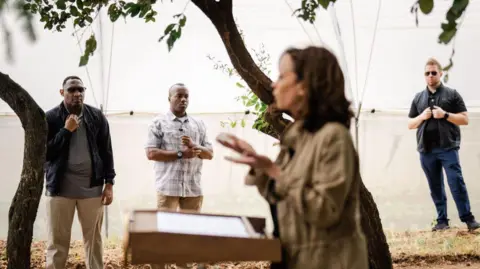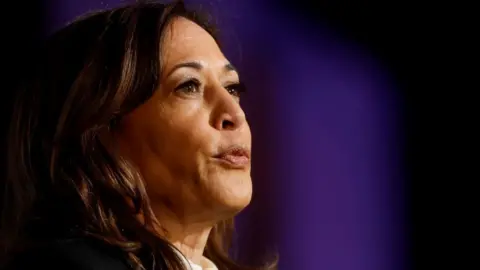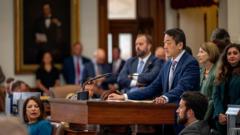For the 2024 election, Kamala Harris is placing her hopes on a powerful coalition of young female voters, particularly in critical battleground states such as Arizona and Michigan. On an unexpectedly warm autumn morning at the University of Michigan’s Ann Arbor campus, students formed lines at early voting centers, eager to make their voices heard. Among the enthusiastic crowd was Keely Ganong, a junior student who expressed her admiration for Harris, emphasizing her supportive stance on gender equality and women's rights.
Embedded within discussions about voting is the sentiment that this election is about personal choices, especially in the realm of reproductive rights. As Lola Nordlinger, a fellow student, highlighted, “A woman’s choice is something that’s so personal to her, and it really should be no one else’s decision.” The palpable excitement about the election can be felt across campus, with students believing their participation will be crucial in shaping the outcome.
Voter polls indicate that Harris has solid support among younger women, particularly those aged 18-29, with a significant lead over her opponents. Reports from the Harvard Institute of Politics and Inside Higher Ed/Generation Lab reveal that female voters are showing up at the polls in larger numbers than men, reaffirming patterns observed in the previous election cycle.
Hannah Brocks, who actively volunteers for the Democrats, shares her experience conveying Harris's empathetic approach to politics, stating, “It’s just so much love and empathy in the way she talks about other people.” Polls indicate that turnout among women voters could be crucial, reflecting a potential repeat of the increased participation seen in 2020.
However, Harris faces challenges in securing votes from all demographics of women. Insights highlight a stark divide in voting preferences among different racial groups, with her advantage among white women under 30 being significantly smaller than that of non-white women. Historical trends reveal that many white women supported Trump in previous elections, showcasing a potential hurdle Harris must overcome.
The stakes are particularly high in Arizona, where voters are considering a ballot question that would solidify abortion rights in the state constitution. Women like Mary Jelkovsky advocate passionately for the cause, drawing attention to the very personal implications of reproductive rights. The Harris campaign aims to harness this issue to rally voters not just among Democrats but potentially sway Republican women disillusioned with the current administration.
Rebecca Gau’s story exemplifies this shift; a lifelong Republican who switched her support to Biden in 2020, she now expresses enthusiasm to vote for Harris, viewing her as a representative of practical American women fed up with “toxic masculinity.” However, dissenting opinions persist, as some women remain loyal to Trump, prioritizing policy over personal differences.
As the election nears, the mobilization of young women could shape the future direction of the electoral landscape, raising the question of whether their voices will indeed be the tipping point for Harris’s campaign. The dynamic interplay of gender, race, and policy promises an intricate battle for the votes that could decide the 2024 election.
Embedded within discussions about voting is the sentiment that this election is about personal choices, especially in the realm of reproductive rights. As Lola Nordlinger, a fellow student, highlighted, “A woman’s choice is something that’s so personal to her, and it really should be no one else’s decision.” The palpable excitement about the election can be felt across campus, with students believing their participation will be crucial in shaping the outcome.
Voter polls indicate that Harris has solid support among younger women, particularly those aged 18-29, with a significant lead over her opponents. Reports from the Harvard Institute of Politics and Inside Higher Ed/Generation Lab reveal that female voters are showing up at the polls in larger numbers than men, reaffirming patterns observed in the previous election cycle.
Hannah Brocks, who actively volunteers for the Democrats, shares her experience conveying Harris's empathetic approach to politics, stating, “It’s just so much love and empathy in the way she talks about other people.” Polls indicate that turnout among women voters could be crucial, reflecting a potential repeat of the increased participation seen in 2020.
However, Harris faces challenges in securing votes from all demographics of women. Insights highlight a stark divide in voting preferences among different racial groups, with her advantage among white women under 30 being significantly smaller than that of non-white women. Historical trends reveal that many white women supported Trump in previous elections, showcasing a potential hurdle Harris must overcome.
The stakes are particularly high in Arizona, where voters are considering a ballot question that would solidify abortion rights in the state constitution. Women like Mary Jelkovsky advocate passionately for the cause, drawing attention to the very personal implications of reproductive rights. The Harris campaign aims to harness this issue to rally voters not just among Democrats but potentially sway Republican women disillusioned with the current administration.
Rebecca Gau’s story exemplifies this shift; a lifelong Republican who switched her support to Biden in 2020, she now expresses enthusiasm to vote for Harris, viewing her as a representative of practical American women fed up with “toxic masculinity.” However, dissenting opinions persist, as some women remain loyal to Trump, prioritizing policy over personal differences.
As the election nears, the mobilization of young women could shape the future direction of the electoral landscape, raising the question of whether their voices will indeed be the tipping point for Harris’s campaign. The dynamic interplay of gender, race, and policy promises an intricate battle for the votes that could decide the 2024 election.





















